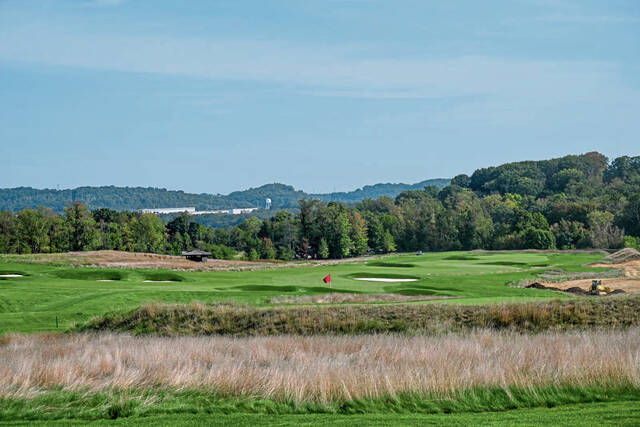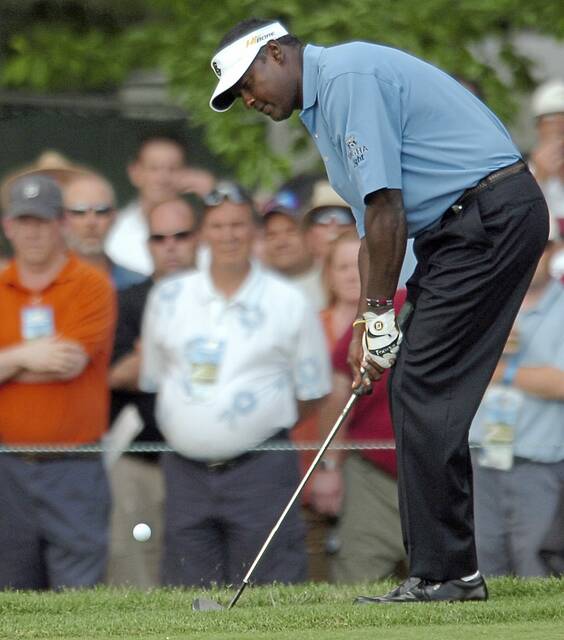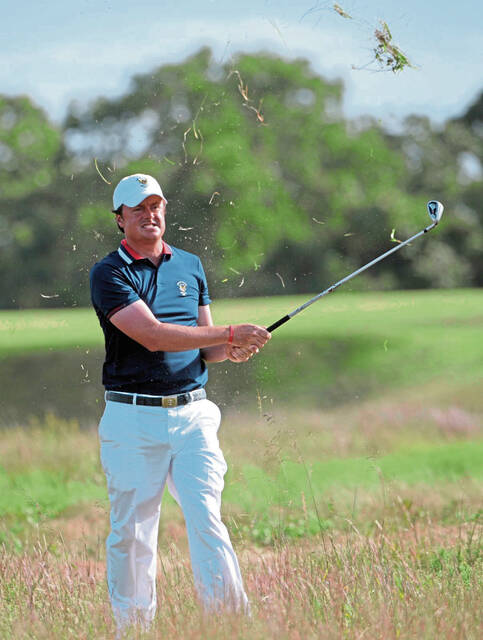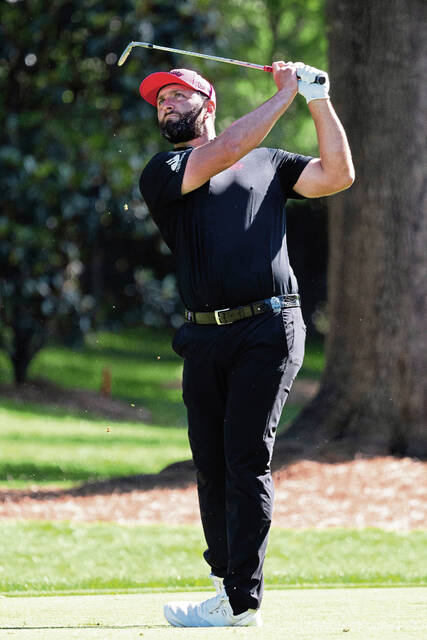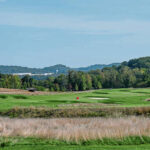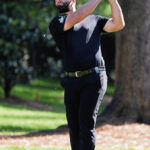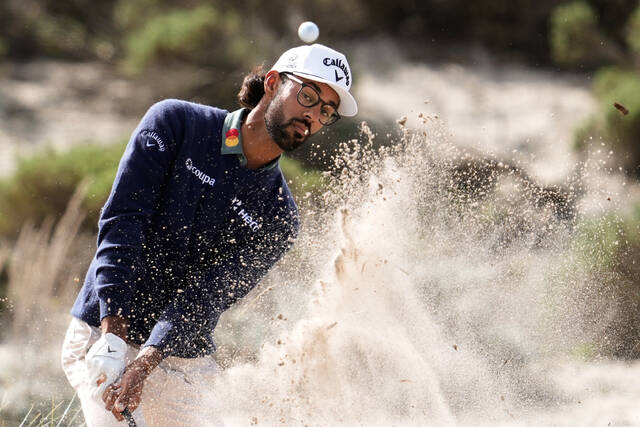From the pristine fairways and lightning-fast greens to the punishing bunkers and club-twisting rough, Oakmont Country Club is one of the toughest tests for even the world’s best golfers, who will descend upon Western Pennsylvania for the 125th U.S. Open from June 12-15.
TribLive is producing a hole-by-hole look at what makes Oakmont Country Club one of the most popular and anticipated stops for the USGA.
Hole 10 breakdown
Length: 461 yards, Par 4
Handicap: 4
2016 U.S. Open stroke average: 4.33
Description
The inward nine starts with one of the course’s toughest holes. Like the first hole, it features a narrow, downhill fairway and a green that slopes from front to back.
Bunkers are placed on both sides of a tight landing zone on No. 10. And a ditch runs across the fairway, which will force players to carefully consider club selection and where to lay up off the tee.
In addition to sloping away from the players, the green also slopes from right to left, which makes approach shots crucial. Depending on the weather and how firm the fairway and green are playing, a smart play is to land an approach short of the green to avoid rolling off the back.
The 10th played as the fourth-hardest hole on the course during the last U.S. Open.
There were 43 birdies on the 10th hole in 2016 as well as 158 bogeys and 16 double bogeys.
Memorable moment from U.S. Open
Phil Mickelson, a six-time U.S. Open runner-up and six-time major champion, had a nightmare on this green in 2007. He four-putted the 10th green en route to shooting 74-77 and missed the cut at 11-over-par.
How the locals play it
Nathan Smith has played in five major championships and on three Walker Cup teams. One of the area’s winningest amateur players, he won the U.S. Mid-Amateur four times (2003, ’09, ’10, ’12), as well as the Sunnehanna Amateur (’11), Pennsylvania Amateur (2002, ’09) and West Penn Amateur (2007-10). He has vast experience at Oakmont during tournaments and as a guest.
“Ten and 11 are holes where I see the most change with what they’ve done with the redesign, where really now you have to feel it out on the tee. You have to know if the fairways are running or are getting a little soft. You want to get it down there as far as you can because it is a long hole, but you don’t want to go into a stream (ditch) in the fairway. If you get out there, it’s very tight. In 2016, Dustin Johnson hit driver into the rough on the left on purpose. You can’t do that anymore. That hole really needs to have your attention.
“On 1 and 10, the contours (on the green) are similar where they run away from you and a little right to left. If you are down there, that’s where I think a lefty will have an advantage because they can hit it and spin it up that hill. You can spin it down to the pin and hold that hill a little more. Right handers, you’ll have to hit a soft cut in there to get that spin going up the hill.”
Around the U.S. Open
Spotlight
Jon Rahm
The 2021 U.S. Open champion, Jon Rahm shot 6-under-par to win the tournament at Torrey Pines and gained the top spot in the Official World Golf Ranking.
Also the 2023 Masters champion, the 30-year-old Spaniard finished tied for 10th in his most recent U.S. Open in 2023 at Los Angeles Country Club.
Rahm shot 7-over and finished tied for 23rd and also was the low amateur in the 2016 U.S. Open at Oakmont.
Before turning pro, Rahm was a two-time winner of the Ben Hogan Award, given to the best amateur golfer. While at Arizona State, he won 11 tournaments, including the 2016 Pac-12 title.
He has 22 victories as a pro, including 11 PGA Tour events. He has played for Europe three times in the Ryder Cup.
By the numbers
191: Acres on which the course at Oakmont Country Club is built
27.5: Justin Thomas’ average putts per round in the 2016 U.S. Open, which was tops in the field
13.8: Average greens hit in regulation per round for champion Dustin Johnson in the 2016 U.S. Open
Quotable
“He’s going to have a lot thrown on his plate, but he’ll be ready and figure it out. … He’s earned it, and I’m just really looking forward to watching him do it.”
—Chris Malloy, Ole Miss golf coach to NBC Sports about 21-year-old junior Michael La Sasso, who earned a spot in the U.S. Open field Monday after winning the NCAA championship.
Golf history
Here’s a look at the players who have captured the most major championships:
1. Jack Nicklaus, 18
2. Tiger Woods, 15
3. Walter Hagen, 11
4t. Ben Hogan, 9
4t. Gary Player, 9
6. Tom Watson, 8
7t. Gene Sarazen, 7
7t. Harry Vardon, 7
7t. Bobby Jones, 7
7t. Sam Snead, 7
7t. Arnold Palmer, 7
12t. Lee Trevino, 6
12t. Nick Faldo, 6
12t. Phil Mickelson, 6
15t. Rory McIlroy, 5
15t. James Braid, 5
15t. John Henry Taylor, 5
15t. Byron Nelson, 5
15t. Peter Thomson, 5
15t. Seve Ballesteros, 5
15t. Brooks Koepka, 5
If you missed it
No. 1: U.S. Open hole by hole: No. 1 at Oakmont among world’s toughest opening tests
No. 2: U.S. Open hole by hole: Sloping green among challenges on No. 2 at Oakmont
No. 3: U.S. Open hole by hole: Church Pews a landmark hazard on No. 3 at Oakmont Country Club
No. 4: U.S. Open hole by hole: Birdie opportunity within reach on No. 4 at Oakmont
No. 5: U.S. Open hole by hole: Aggressive play can be rewarded on No. 5 at Oakmont
No. 6: U.S. Open hole by hole: Danger lurks on, around No. 6 green at Oakmont
No. 7: U.S. Open hole by hole: Players will face mental test with club selection on No. 7 at Oakmont


